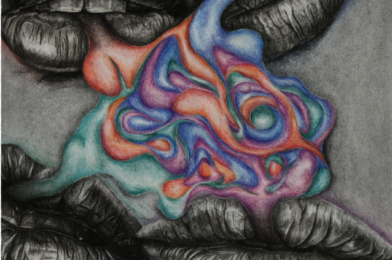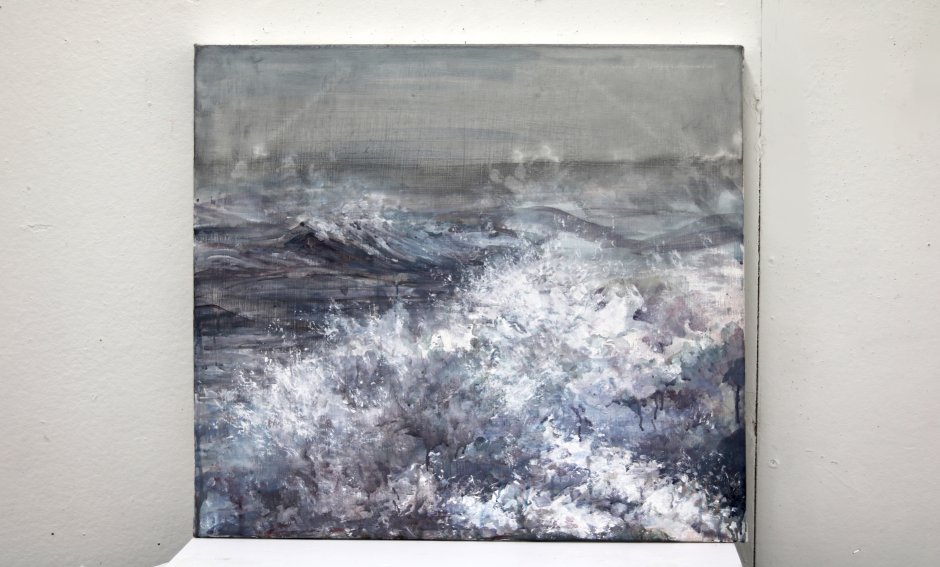The veteran lives in his daughter’s house. He draws his curtains and lies on his bed. Its frame creaks, and it rots, and its mattress depresses with his weight, and a war torn land crosses his mind again. He thinks of barrenness, as he lies in his bed. But in spite of the sounds that come and stay, he lies and finds comfort in his bed’s depression.
He glances at his nightstand. A lamp, unlit, rests atop. A sepia woman sits next to it, captured in a photograph, darkened by light’s shadow—insignificant to the forgetful veteran. She had fled him, he had fled her. Besides the war he forgets most things.
He reaches for the nightstand in hopes of remembrance. He aims for the sepia woman, but he shakes and shakes more. The hand, a steamship, transports to the nightstand. But the hand, the feminine fingertips, the importance, the ship, she diverts her path—her hull trembles. She succumbs to a brighter light, guiding her into deeper, bluer obscurity. Steam puffs and flies in a different direction. She changes her course, the ocean’s breezes. The hand finds itself atop the handle of an antique drawer. She forgets again the photograph for which she had once lived. But reasons to live are only memories to the ship, drunken by the ocean.
The hand clenches the nightstand’s hinge, and she pulls toward her person. The drawer glides ajar to reveal tall bottles, hard liquor, poison to the curtains, drawn evermore. The veteran thinks of war and screaming memories. The steam’s puffing and flying ceases, the dark room falls silent, and the drawer empties along with the old man’s mind, drunken.
Adjacent to the veteran’s room, a boy sits in a caned chair facing a mirror he stole from his mother’s vanity. His window grants passage to a mid-afternoon light, readying itself for the profound tone it saves for evening and night. He had grown up wishing for a lake by his house, one to reflect the colors of a setting sun, perhaps to echo birds’ songs.
The old man’s sorrows reach his grandson. The boy hears an opening of a drawer and a clinking of tall bottles, making way for more clinking and more bottles and emptiness. However, he does not dwell on the tall bottles, but the thin walls, and he wishes quiet, blissful little things for his grandfather. He hopes these things would happen within their lifetimes, but maybe ideals belong to a world with a lakeview through his window. Maybe bliss belongs to a world of birds’ melodies.
Deliberately the boy studies himself in the mirror. He hopes to the mirror often, mostly for materials, objects to display and then to discard. But today he hopes for clarity. He sees an unbrushed hair and combes it to his scalp. The mirror reflects a beauty, one exclusive to novelty and soft changes in light.
First the walls hear clinking of full bottles, then empty ones. They hear an old man sigh dimly upon a glance of a photograph; he obliges another drink. And the boy who sees himself in the looking glass sighs, too, as he hopes and prepares for changes and a setting sun. Maybe a setting sun could bring him acceptance. The walls mute the family’s stilling echoes.
As his mother warms gravy in the kitchen, the doorbell rings, and the boy descends to where the wallpaper peels in the foyer. The doorway’s opening reveals a boy his age, who smiles at the sight of him. The boy leads his visitor to an area outside the screened-in-porch. He closes the door shut before arriving there, however, and he smiles back at his guest. The door sends an echo throughout the house, which travels to a room with drawn curtains.
The veteran had been sleeping, his fingertips embracing tall bottles. He had heard a door meet its threshold and, somewhere in the scape, a latch accept its lock. He wakes and moves to the windows and furls their drapes. The daylight instills in him a feeling so warm that he chooses to furl the rest of the blinds and do away with them completely for the evening. He looks outside from his bedroom’s vantage, escaping his dark room through the pane. He searches for the person who closed the door, who made him furl his drapes.
The veteran sees his instiller of light, his grandson, standing before his daughter’s house’s façade. He presses delicate hands to the window and sees another boy smiling slowly at his grandson. It seems as though the guest offers something to the boy, something blurred, as the old man’s eyeglasses render useless from the nightstand. The boy’s hand approaches the guest’s in reach of the blur. Gently it transfers between the two silhouettes, and after, the guest’s eyes shimmer for a moment, which passes so quickly that if the old man upstairs had blinked or drunk or died, he would have missed the shimmer.
He is unsure of what overcame his grandson in response to this shimmer. His countenance directs away from his window. However, he believes his grandson reciprocated the guest’s sentiment, as their hands still linger where the blur’s transfer had taken place. Then the guest holds tighter to his grandson’s hand for one unapologetic second.
He leaves the front door and the screened-in porch and the boy, who smiles slowly, stunned.
The veteran realizes the possibility of there having been no object, no blur, and their hands only touched because of the moment’s clarity. They were only but silhouettes, after all. He notices his fingertips embracing nothing but the window.
The sun descends loftily. The veteran no longer thinks of war and screaming things, but of his grandson, who held a boy’s hand and found acceptance under the shadow of a setting sun.
An unfamiliar sobriety shields the old man’s face. He looks at the sepia woman atop his nightstand, and he sentinels himself before her. The window, blurry yet tender, had reminded him to protect her, their memory. In truth, he may have seen her in color for one fraction of a moment.
He turns on the lamp next to her. He lets it shine onto her frame, giving her light like his grandson had for him. He becomes her sun like he had become his. He remembers forgotten things and descends to his daughter, who warms gravy in the kitchen. He brings his glasses with him.
—Adelaide, he says at the bottom of the stairs. He sees clearly. He pauses. He repeats himself and apologizes. He mumbles subtleties to his daughter. His eyes tear slightly, blueing lightly. My darling, he says quietly. He whispers to her more.
His daughter leans over the stove but releases her wooden spoon after hearing his mournful cadence repaired. She lets go. She holds his face and serves him dinner.
The boy, however, forgoes his mother’s gravy while he protects his guest’s path and watches it stretch into disappearance outside. Our lifetimes will meet again, he thinks. But in the meantime, I’ll stay with your memory. The walls might forever hold the smell of that night’s gravy.
His path disappears, so the boy comes inside. The sun has set. He sees his mother holding onto, collapsing her entirety onto a delicate man who misses evening meals. His shoulders, scarred from the land where they fought and the bottles they emptied, feel embraced, beloved, felt.
The veteran sees his grandson enter the kitchen. He lets his eyeglasses glide the bridge of his nose. The boy seems delighted and his mother complete, but the old man shows no emotion and says not a word. He only breathes a labial hum one expels when they can finally grasp something with an intense understanding.
His grandson had shifted something inside him. Unclear whether he feels heavier or more light, he knows nothing left him, but something old thawed. A war inside the veteran had broken; a window, opened. His grandson had alighted him from the nightstand, from the sepia woman, from the depression in his mattress.
The old man considers thanking his grandson for daylight and for remembrance. He had shown him a setting sun, something about life, and something about living.
Meanwhile, the boy thinks again of his guest. The setting sun had brought him what he wanted. He imagines a songbird’s call echoing off a lake. He feels the same tingling he had earlier, yielded by that affectionate hand on his.
Adelaide lets down her hair and pulls out a chair after hanging her apron by the stovetop. She sees her father already sitting, already sniffing warm gravy, already dropping warm, blue tears onto his placemat with every glance he steals from her son.
At the table, the veteran sees his grandson thinking of another boy’s shimmering eyes. So with his own, the grandfather weeps volumes of prideful acceptance.
Benjamin Herdeg is a high school student who just started creative writing over the summer, during the pandemic. He “uses writing as a vent into which he pours lots of emotion and unfinished thoughts.”
Tagged : benjamin herdeg / Fiction / flash fiction / veteran / war

